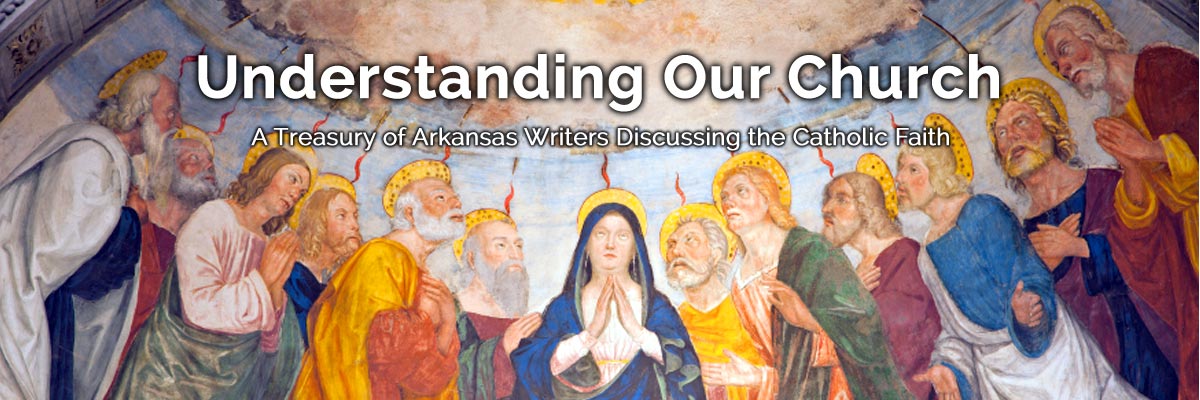Official Website of the
Catholic Diocese of Little Rock
True freedom for Catholics is centered on choosing good
Published: July 21, 2016
By Deacon Matthew Glover
Chancellor for Canonical Affairs
Just a couple of weeks back, we as a nation celebrated our Independence Day. No doubt many of us enjoyed food, family, fun and perhaps some fireworks. And, somewhere along the way, we also gave thanks for the freedoms that we all enjoy here in the United States of America — freedoms that were bought and are continuously preserved at great price by others whom we will never know in this lifetime.
Our American freedom is further enshrined in our Declaration of Independence, which is the founding document of our freedom. It recognizes that all people are created equal, and that from God we have all been given “inalienable rights,” which means cannot be granted or taken away by any earthly government. They just are.
As Americans, we love our freedom — or, at least, what we like to consider “freedom.” For our society, freedom often means being able to do pretty much whatever we want, so long as it’s not hurting anyone else.
As long as we are still tempted to choose sin and evil, we are not completely and totally “free.” Of course, we won’t ever be completely free during this lifetime, but that’s our aim and our goal. Why? Because at the end of the long struggle for true freedom lies our only true happiness — union with God our creator.
As Catholic Americans, we ought to have a radically different view of “freedom.” The Catholic tradition has long recognized and defended the concept of free will. But our Catholic tradition would not necessarily recognize our society’s notion of freedom as true freedom.
For Catholics, true freedom is when someone has chosen the good so often and so repeatedly, that it has become a habit, a routine, a way of life — so much so that choosing evil would not even occur to him or her as a legitimate option.
As long as we are still tempted to choose sin and evil, we are not completely and totally “free.” Of course, we won’t ever be completely free during this lifetime, but that’s our aim and our goal. Why? Because at the end of the long struggle for true freedom lies our only true happiness — union with God our creator.
Perhaps the greatest explanation of freedom in our Catholic tradition comes from St. Thomas Aquinas. In his “Commentary on the Sentences,” he notes that freedom is inherently ordered toward the good, and so being indecisive in the face of good and evil is not in fact freedom. Rather, freedom “is by its nature ordered to the good, and tends to evil only by defect.” (II Set., Dist. 25, Q. 1, A. 1, Ad. 2).
Thus, to the extent that our freedom allows us to even think about choosing evil, our freedom is defective.
In his “Summa Theologica,” St. Thomas Aquinas compares the freedom of humans with the freedom of angels. He’s not saying that humans ought to become like angels (that’s not a part of God’s design). But rather, he’s trying to make a point about the nature of true freedom.
He says that the ability of freedom “to choose something not ordered to the end, that is, to sin, evinces a defect of freedom. Therefore the angels, who cannot sin, enjoy greater freedom of choice than we do, who can.” (Ia, Q. 62, Art. 8, Ad. 3)
For Aquinas, and for us as Catholics, the greatest freedom lies in the inability to sin — not because we are perfect or have no choice in the matter, but because choosing the good is so ingrained in us that choosing evil isn’t even on our radar. The great Dominican moral theologian Servais Pinckaers calls this the “freedom for excellence.” And this “habit” of choosing excellence is called virtue.
The United States’ founding fathers believed that virtue was essential to a democratic republic, and Benjamin Franklin wrote that “only a virtuous people are capable of freedom.” Over the past 240 years, more than 1.1 million Americans have died in battle.
Those Americans died to obtain or protect all the freedoms that you and I now enjoy. We owe it to them, to God and to ourselves, to use those freedoms wisely; to use our freedoms for excellence. And to live in such a way that choosing the good becomes a habit — for that’s the only way to attain true freedom.




